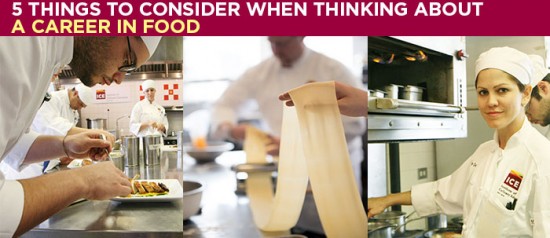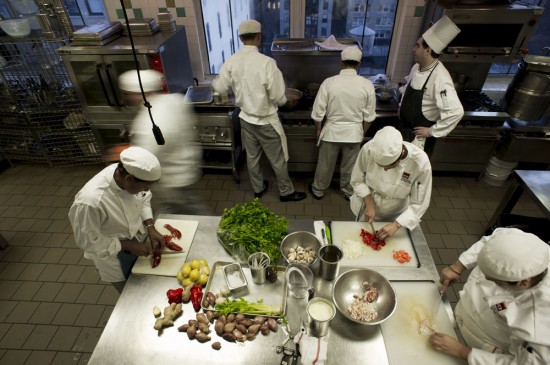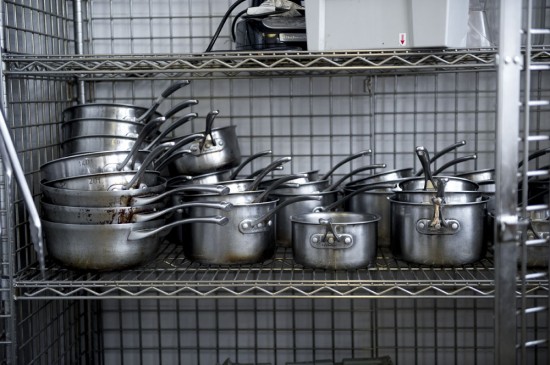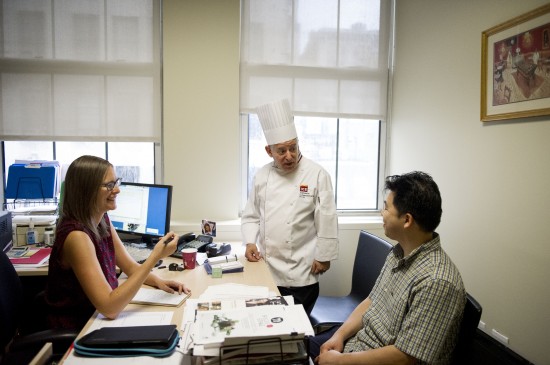The process of choosing your future is an equal combination of inspiration and preparation. When it comes to careers in food, a strong sense of inspiration is often what comes first, but without a clear plan—not to mention the resources and information to help create one—it can be tough to feel prepared to make a decision.

You might already have questions or maybe you’re wondering, “What are the right questions?” So, in anticipation of our Find Your Culinary Voice (and Career) panel on September 10 at 6:30pm, we asked our faculty of industry experts to share their insider perspectives.
Is it the right time for me to consider a career in food?
Steve Zagor, Dean of Business & Management says, “The right time to consider a career in food is when you realize your current life is unfulfilling and you can’t stop thinking about food, restaurants or cooking.” Andrea Tutunjian, Director of Education agrees: “Making the effort as you have to come to ICE means you have a passion and desire for this industry. Timing is a personal consideration, but the [current] shortage of qualified industry professionals makes it more ideal.”

Linda Simon, Senior Associate Director of Admissions, says it’s about finding value in your day-today experiences. “There’s an old expression…if you keep doing what you’ve always done, you’ll keep getting what you’ve always gotten. If you’re okay with that, then it isn’t the right time [ to make a change]…but if you’re not, then it is time to start considering what drives your “always”.
What is the value of a professional program, versus “working my way up” in the industry?
“A strong culinary school will provide you with connections and perspective that would be much harder to gain on your own,” says ICE President Rick Smilow. Andrea echoes this sentiment: “You can work your way up through the ranks, but most of us are not a ‘Bill Gates.’ Education provides you with the opportunity to have doors opened that might not be otherwise. It will also give you an edge over others working in the field, and allow you to move up through the ranks more quickly and allow you to earn more money in the long run.”

Linda agrees: “A culinary career is a much faster track towards a career in food than ‘working your way up.’ In fact, you are always working your way up, but an education not only teaches you the proper skills, but it also creates networking opportunities across a much broader spectrum, than just working in one business or for one chef.”
“Graduating from a career program gives you an immediate foundation that would take years to develop through on the job training and personal research”, says Maureen Drum-Fagin, Director of Career Services. “Plus you join a professional network on day one that opens up opportunities for not only your first job, but also your long-term career goals.”
What kind of career options are available, and how will I earn a living?
"There are too many opportunities to name!" laughs Maureen. "Beyond restaurant chef positions, there are career paths in catering, hotels, corporate/educational/healthcare contact foodservice, gourmet/specialty markets, personal/private chef, research and development work, specialty pastry, food media and marketing, culinary instructor---even food trucks!
For career changers, Steve says, “The skills and insight you learned in your previous life will be put to good use in the restaurant world. Decision making, working with people, seeing the big and small pictures—all these life experiences combine with your newly learned food knowledge. The result can be a smoother pathway to either a fulfilling role in an established business as a creative leader or you can set out as an entrepreneur and develop your own business.
For those with less prior work experience, Linda acknowledges, “Like any other career path, entry level salaries can be low, but [that is] short lived. The good news about this industry is that there are many job opportunities and growth potential is exponential.”

“Because there is currently a shortage of talent, it’s easier in this field to act a series of faster promotions, which can get you well beyond the low starting rates.” says Rick. “Additionally, there are great employers and employment prospects in other parts of the country where the cost of living is lower. And notably, we see some ICE alumni who, after graduating, choose to pursue fulfilling freelance or part-time culinary work, while maintaining their former careers.”
Is it true that there is a shortage of good restaurant professionals right now?
Steve says, “There is always a shortage of talented trained, motivated staff.”
“The number of restaurants opening has grown,” adds Maureen, “and there are many more outlets in which cooks can find work, be it corporate dining or specialty food markets. If you are driven and dedicated, there is a position out there for you!”
Rick explains, “One of the reasons [for the shortage] is that so many upper mid-level Sous Chefs and Chefs de Cuisine move on to open their own establishments. Incidentally, that shows that entrepreneurial options are very much viable options in today’s culinary landscape.”
It’s good news for the industry,” argues Andrea, “A shortage of good professionals means that salaries should go up, by the laws of supply and demand.”
Will the skills I have already learned in my current work be of use in my new career?
“One of the great things about transitioning into the food industry from a different career path is the ability to utilize your former skills,” says Linda.” Former artists, health care providers, lawyers, financiers and educators find that all their skills are called upon in the food industry. For example, people may think they are going out for dinner just to enjoy the food, but feeling taken care of is what enhances their dining experience. Prior skills can prepare you to better succeed in doing that.”
Maureen agrees, “Career changers often find that skills sets that they come in with—be it journalism, graphic design, other management backgrounds—are often instrumental in new careers and increase the pace with which they are able to advance in their chosen career track.
Rick adds, “Time and again, we hear stories of how a chef or restaurant owner comes to realize that ICE graduates they have hired have ‘other job skills’ which can contribute to a more efficient and profitable business.”
“Absolutely yes, “ says Andrea. “Any prior work experience that has contributed to your working habits and ethics will go with you anywhere. “




